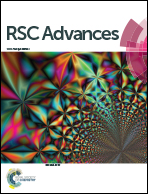Replacement of feed by fresh microalgae as a novel technology to alleviate water deterioration in aquaculture†
Abstract
The main aim of this work was to evaluate the feasibility of microalgae-assisted aquaculture and explore the relevant mechanisms. In this regard, our work explored the pollution problems in traditional aquaculture and studied the contribution of microalgae to eutrophication control, oxygen gas production and feed replacement. Besides, potential protection mechanisms of microalgae-assisted aquaculture were studied by bacterial community profile analysis and microscope observation. The results showed that microalgae performed well in nutrient assimilation and oxygen production, thus slowing down the eutrophication and preventing oxygen depletion in aquaculture. Study of the mechanisms revealed that microalgae-assisted aquaculture contained much fewer pathogens and a microalgal biofilm was formed to prevent the eutrophication caused by sludge degradation. It is expected that the findings in this work can support the further development of microalgae-assisted aquaculture and promote the industry upgrade.



 Please wait while we load your content...
Please wait while we load your content...